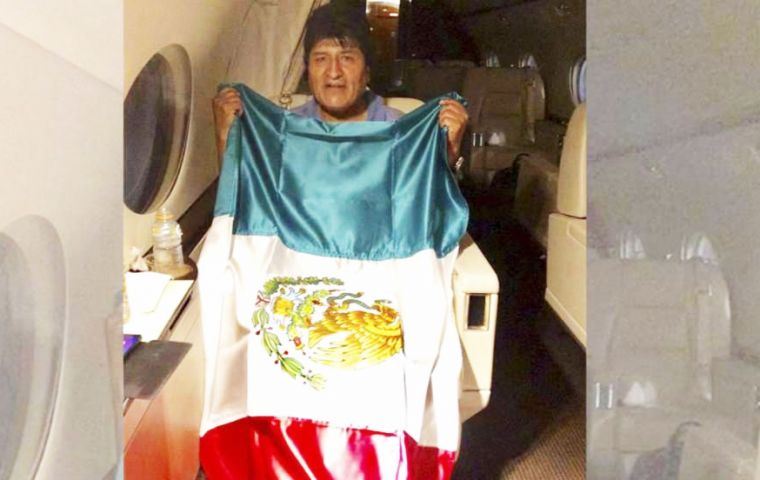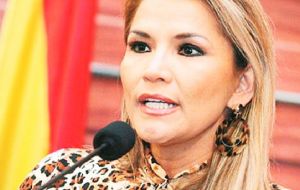MercoPress. South Atlantic News Agency
Bolivia's Morales flying to political asylum in Mexico, promises to return
 Morales boarded a Mexican government plane from the central Bolivian town of Chimore, a stronghold of his supporters where he retreated over the weekend
Morales boarded a Mexican government plane from the central Bolivian town of Chimore, a stronghold of his supporters where he retreated over the weekend  Mexican Foreign Minister Ebrard said that Morales had boarded the plane “to ensure his safe journey to our country,” and said the aircraft had taken off.
Mexican Foreign Minister Ebrard said that Morales had boarded the plane “to ensure his safe journey to our country,” and said the aircraft had taken off.  With Morales’ deputy and many allies gone with him, opposition politician and Senate second vice-president Jeanine Añez said she was willing to take control
With Morales’ deputy and many allies gone with him, opposition politician and Senate second vice-president Jeanine Añez said she was willing to take control Bolivia’s ousted president Evo Morales was flying to political asylum in Mexico on Monday night, the latest step the once-beloved leader’s rapid fall, while military and police deployed in the streets of La Paz to quell violence.
Morales, who was the country’s first indigenous president, boarded a Mexican government plane from the central Bolivian town of Chimore, a stronghold of his supporters where he retreated over the weekend after weeks of protests over a disputed election win loosened his grip on power.
In a tweet, he confirmed he was departing for México, but pledged to return with more “strength and energy.”
Mexican Foreign Minister Marcelo Ebrard said on Twitter that Morales had boarded the plane “to ensure his safe journey to our country,” and said the aircraft had taken off.
Ahead of the news of Morales’ departure, the military said it would join Bolivia’s overwhelmed police in patrolling the streets, after protesters destroyed at least four police stations amid looting in some areas.
The departure of Morales, who was part of a wave of leftists who dominated Latin America’s politics at the start of the century, followed weeks of violent protests over allegations of fraud in the Oct. 20 election.
The 60-year-old former llama herder and coca leaf farmer was viewed by many as a champion of the poor who brought steady economic growth. But others saw him as an autocrat who overstepped by defying a referendum on presidential term limits.
His government collapsed on Sunday after the Organization of American States (OAS) delivered a damning report on serious irregularities during the October vote, prompting ruling party allies to quit and the army to urge him to step down.
The audit found “clear manipulation” of the count and “serious security flaws,” which the OAS said meant the result should not stand and new elections should be held.
Earlier Monday, thousands of Morales supporters began to march toward La Paz from the nearby city of El Alto, which provoked panic among police in the city, who implored residents to fend off the protesters with sticks and other weapons if need be.
Around La Paz’s central Murillo square and other parts of the city, opposition protesters erected roadblocks made of metal scraps and other debris.
“It’s very worrying. There was a lot of fear and panic last night. I think people are similarly if not more scared this evening,” a Western diplomat in the city said, adding that most embassies had been shut with staff working from home.
Legislators, who had been discussing the nuts and bolts of a potential provisional government on Monday in the assembly under heavy police guard, were later evacuated, one lawmaker said.
But by late Monday night, it had become clear that the dramatic showdown would not come to pass, as the march dissipated when protesters wended their way downhill into the city center.
Much of the city had returned to an uneasy calm late on Tuesday, punctuated by acts of vandalism and confrontations with police in some areas, as residents manned thousands of makeshift roadblocks throughout the city.
Foes celebrated Morales’ departure but also moved to find a temporary successor before a presumed new election in the landlocked nation that is one of South America’s poorest, dependent on farming and natural gas.
With Morales’ deputy and many allies in government and parliament gone with him, opposition politician and Senate second vice-president Jeanine Añez flew into La Paz saying she was willing to take control. She was later taken by the military to the legislative assembly.
“If I have the support of those who carried out this movement for freedom and democracy, I will take on the challenge, only to do what’s necessary to call transparent elections,” said Añez, who is constitutionally next in line to assume the presidency.
Speaking tearfully about the crisis, she said the Senate would look to hold a session on Tuesday and urged members of Morales’ Movement for Socialism (MAS) party to attend to find a constitutional solution and interim president.
Morales’ resignation still needs to be approved by the Legislative Assembly, convened by both chambers of Congress. The Assembly said it planned to meet at 4 p.m. (2000 GMT) on Tuesday, though with clashes gripping the city it was not yet clear if it would go ahead.




Top Comments
Disclaimer & comment rules-

Read all commentsMorales gave in awfully easily... and more so his deputy and allies in government. Can't have a fair election if one side has fled the country. I'd like to know just what the army chiefs said to him.
Nov 12th, 2019 - 08:01 am 0Commenting for this story is now closed.
If you have a Facebook account, become a fan and comment on our Facebook Page!